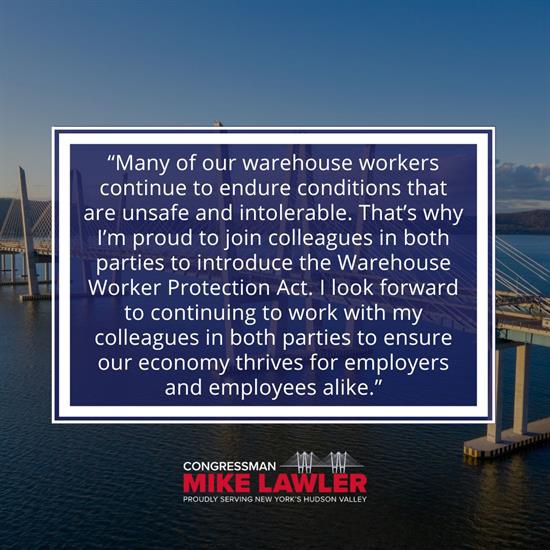Press Releases
Representatives Lawler, Norcross, Smith, and Stevens Introduce Bipartisan Warehouse Worker Protection Act
Washington, DC,
June 6, 2024
Yesterday, Representative Mike Lawler (R-NY-17) joined Representatives Donald Norcross (D-NJ-01), Chris Smith (R-NJ-04), and Haley Stevens (D-MI-11) in introducing the bipartisan Warehouse Worker Protection Act to improve safety by requiring companies with large warehouses to disclose quotas to workers and prohibiting quotas that interfere with health and safety. The Department of Labor’s Office of Inspector General audit found that injury and illness rates in warehouses are consistently high. The report found that in 2021, the injury and illness rate was 5.5 per 100 employees for warehouses, which is more than double the rate across all industries. A recent study also found that more than half of employees at Amazon and Walmart, two of America’s largest private companies, report their production rate makes it hard for them to use the bathroom at least some of the time. The Warehouse Worker Protection Act requires companies to provide written descriptions of quotas workers are subjected to, any disciplinary action that would result from failure to meet the quota, and the existence of any incentive or bonus program associated with each quota and how the quota is monitored. The bill also prohibits companies from establishing quotas that prevent a worker from complying with any meal or rest period or from the use of bathroom facilities. “The rate of injury and illness among warehouse workers is more than double the rate across all industries,” Congressman Lawler said. “While some steps have been taken to address working conditions over the years, many of our warehouse workers continue to endure conditions that are unsafe and intolerable. We must do better for these workers that form the backbone of the American economy. That’s why I’m proud to join colleagues in both parties to introduce the Warehouse Worker Protection Act. I look forward to continuing to work with my colleagues in both parties to ensure our economy thrives for employers and employees alike.” “The increasingly dangerous working conditions at warehouses across the country that result from these quota systems are wholly unacceptable,” Congressman Norcross said. “In 2022, three New Jersey warehouse workers tragically died on the job within just weeks of each other, bringing attention to working conditions and injury rates in warehouses. Businesses can keep workers safe and earn a profit - but that’s only possible with more transparency and more accountability to bring warehouse safety standards up to date. As a former electrician, I know firsthand what it is like to lose a worker on the job, which is why I’m proud be working with my colleagues on both sides of the aisle to introduce the Warehouse Worker Protection Act and ensure everyone goes home from work the same way they went to work: safe and unharmed.” “This critical legislation will help ensure that America’s warehouse workers are able to diligently perform their jobs in safe conditions and prevent needless injuries—and even deaths—from occurring so they can remain healthy while earning an honest living,” Congressman Smith said. “The hardworking Americans who operate our warehouses in New Jersey and across the country are the backbone of our economy. It is unconscionable that these workers are often subjected to especially hazardous conditions that result in higher rates of injury and illness than other occupations.” “Our warehouse workers comprise the backbone of our 21st century consumer economy,” Congresswoman Stevens said. “That’s why I’m proud to co-lead the Warehouse Worker Protection Act with Rep. Don Norcross, which will make sure every worker stays safe on the job with clear performance expectations and access to needed meal and restroom breaks, among other provisions. Workers keep our businesses and economy humming and this legislation will make sure they have the protections they need to do their jobs well.” The Senate companion bill for the Warehouse Worker Protection Act was introduced by Senators Ed Markey (D-MA), Tina Smith (D-MN), and Bob Casey (D-PA). It is endorsed by the International Brotherhood of Teamsters, the AFL-CIO, the United Food and Commercial Workers, the National Employment Law Project, the Athena Coalition, and Oxfam. Bill text of the Warehouse Worker Protection Act can be found here. More information on the legislation can be found below: Enforcement The bill will establish a Fairness and Transparency Board within the Department of Labor to share resources and responsibilities through OSHA and Wage and Hour. It will be comprised of union and employer representatives, health experts, civil rights experts, workplace technology experts and worker protection experts and will be charged with enforcing the guidance and rules laid out within the legislation. Requirements with Respect to Warehouse Quotas All workers hired will be given a written description of the following:
Prohibited Quotas Employers will not be able to establish quotas that would:
First Aid Standard
Congressman Lawler is one of the most bipartisan members of the 118th Congress and represents New York's 17th Congressional District, which is just north of New York City and contains all or parts of Rockland, Putnam, Dutchess, and Westchester Counties. |




